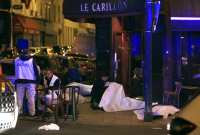Support strong Canadian climate journalism for 2025
ANTALYA, Turkey — Prime Minister Justin Trudeau's unexpected baptism of fire in international statesmanship began Saturday when he arrived at the G20 summit in Turkey, less than a day after the deadly Paris attacks.
Friday's co-ordinated strikes in the French capital, which left at least 129 dead and many more wounded, threatened to overshadow the G20's economic agenda, as well as the growth and infrastructure initiatives that Trudeau planned to emphasize in his first meetings with world leaders.
Finance Minister Bill Morneau said that was entirely acceptable, given the "terrible tragedy" of the Paris attacks, and the fact that Turkey is on the front line of the Syrian refugee crisis.
"The discussion of refugees was always intended to be on the agenda," Morneau said Saturday night. "The discussion around the financing of terrorist activities was always intended to be on the agenda. So I suspect that we will spend more time talking about those issues than we might have otherwise."
The focus on terrorism and refugees immediately shone a spotlight on two of Trudeau's key foreign policy decisions related to the war against Islamic militants and the mass migration of innocent civilians that has spawned.
Trudeau is expected to face the first of many questions from key allies, including the Americans, over his decision to withdraw Canada's six CF-18 fighter jets from the U.S.-led coalition that is bombing militants in Iraq and Syria.
And despite his promise that Canada will accept 25,000 Syrian refugees by the end of the year, and will give $100 million to the United Nations refugee agency, there are calls from various quarters — including G20 host Turkey — to do more on that front.
Trudeau did not speak publicly after arriving late Saturday afternoon at the heavily fortified Turkish coastal resort of Antalya.
But a senior official in his office, who briefed reporters Saturday night, said that Canada would end the air mission, but refocus its efforts on training ground troops.
The government would also ensure that the refugees that are brought to Canada will be chosen in a "safe and responsible" manner to deal with possible security threats, said the official, who spoke on the condition they not be named.
Trudeau is to meet Monday with Turkish President Recep Tayyip Erdogan, who has placed the refugee crisis on the G20 agenda because of the ongoing carnage in neighbouring Syria, which has sent more than two million asylum seekers to Turkey.
Turkey planned to push its fellow G20 members, including Canada, to offer more assistance to help it cope with the influx of refugees.
"We will talk about more burden sharing for the Syrian case," Selcuk Unal, Turkey's ambassador to Canada, said in a recent interview.
"The international and regional developments now taking place compel everybody to talk about these issues."
But Turkey, along with international aid agencies, is looking for more.
"We are asking every responsible member of the international community, including Canada . . . we have been asking this of everybody: more bilateral assistance," said Unal.
So far, Turkey has spent $8 billion dealing with the refugee crisis but has received $471 million in bilateral assistance, he said.
Canada has not given any direct assistance to Turkey, but has contributed indirectly through multilateral agencies, such as the UN.
"The increase in humanitarian assistance is very important for Turkey (and) for all neighbours of Syria," Unal added, citing Jordan and Lebanon, which have also been flooded with refugees.
The international aid agency Oxfam also urged G20 leaders to do more to support the countries bearing the brunt of the refugee crisis.
"Leaders must agree to provide more funds to meet the needs of refugees in host countries, and welcome their fair share of refugees through resettlement and by offering other safe and legal routes to their countries," said Steve Price-Thomas, Oxfam's deputy advocacy director.
Unal said Turkey believes the festering Syrian crisis can only be solved through diplomacy.
"We also think the issue should be addressed at the root cause, which means the regime issue in Syria."
The Syrian civil war, now in its fifth year, has forced millions of refugees into neighbouring countries, as well as contributing to the unprecedented exodus of hundreds of thousands of asylum seekers into Europe.
French President Francois Hollande cancelled his G20 travels, after declaring a state of emergency following Friday's attacks.
Hollande's absence underscored the urgency compelling his G20 fellow leaders, including Trudeau, to address the persistent terrorist threat posed by the Islamic State of Iraq and the Levant, which was born out of the ongoing Syrian carnage.
Trudeau received briefings from the RCMP and Canada's spy agency, CSIS, on Friday before departing on his one-week trip to Turkey and the Philippines, said a spokesman in his office.
Just before boarding his plane out of Ottawa Friday night, Trudeau said he was taking steps to ensure the security of Canadians was safeguarded.
Trudeau's first formal bilateral meeting takes place at the G20 summit on Sunday with Indonesian President Joko Widodo followed by Mexican President Enrique Pena Nieto.
On Monday, he has meetings planned with Chinese President Xi Jinping and German Chancellor Angela Merkel.
Mike Blanchfield, The Canadian Press



Comments